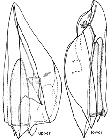WoRMS taxon details
Clausophyidae Bigelow, 1913
135337 (urn:lsid:marinespecies.org:taxname:135337)
accepted
Family
Clausophyinae Bigelow, 1913 · unaccepted
- Genus Chuniphyes Lens & van Riemsdijk, 1908
- Genus Clausophyes Lens & van Riemsdijk, 1908
- Genus Crystallophyes Moser, 1925
- Genus Heteropyramis Moser, 1925
- Genus Kephyes Pugh, 2006
- Subfamily Clausophyinae Bigelow, 1913 accepted as Clausophyidae Bigelow, 1913
- Genus Thalassophyes Moser, 1925 accepted as Heteropyramis Moser, 1925 (junior synonym)
marine, fresh, terrestrial
recent only
(of Clausophyinae Bigelow, 1913) Bigelow H.B. (1913). Medusae and Siphonophora collected by the U.S. steamer "Albatross" in the Northwestern Pacific. <em>Proceedings of the United States National Museum.</em> 44(1946): 1-119, pls. 1-6., available online at https://www.biodiversitylibrary.org/page/15705994
page(s): 70 [details]
page(s): 70 [details]
Taxonomic remark The author of Clausophyidae is not Totton (1965), but Bigelow (1913) who introduced the subfamily Clausophyinae.
According...
According...
Taxonomic remark The author of Clausophyidae is not Totton (1965), but Bigelow (1913) who introduced the subfamily Clausophyinae.
According to the ICZN article 50.3.1. L "The authorship of the name of a nominal taxon within the family group, genus group or species group is not affected by the rank at which it is used" [details]
According to the ICZN article 50.3.1. L "The authorship of the name of a nominal taxon within the family group, genus group or species group is not affected by the rank at which it is used" [details]
Schuchert, P. (2024). World Hydrozoa Database. Clausophyidae Bigelow, 1913. Accessed through: World Register of Marine Species at: https://www.marinespecies.org/aphia.php?p=taxdetails&id=135337 on 2024-11-10
Date
action
by
![]() The webpage text is licensed under a Creative Commons Attribution 4.0 License
The webpage text is licensed under a Creative Commons Attribution 4.0 License
original description
(of Clausophyinae Bigelow, 1913) Bigelow H.B. (1913). Medusae and Siphonophora collected by the U.S. steamer "Albatross" in the Northwestern Pacific. <em>Proceedings of the United States National Museum.</em> 44(1946): 1-119, pls. 1-6., available online at https://www.biodiversitylibrary.org/page/15705994
page(s): 70 [details]
context source (Hexacorallia) Fautin, Daphne G. (2013). Hexacorallians of the World. (look up in IMIS) [details]
basis of record Totton, A. K. 1965. A Synopsis of the Siphonophora. London, British Museum (Natural History). Pp. 230.
page(s): 192 [details]
additional source Bouillon, J.; Gravili, C.; Pagès, F.; Gili, J.-M.; Boero, F. (2006). An introduction to Hydrozoa. Mémoires du Muséum national d'Histoire naturelle, 194. Muséum national d'Histoire naturelle: Paris, France. ISBN 2-85653-580-1. 591 + 1 cd-rom pp. (look up in IMIS) [details]
page(s): 70 [details]
context source (Hexacorallia) Fautin, Daphne G. (2013). Hexacorallians of the World. (look up in IMIS) [details]
basis of record Totton, A. K. 1965. A Synopsis of the Siphonophora. London, British Museum (Natural History). Pp. 230.
page(s): 192 [details]
additional source Bouillon, J.; Gravili, C.; Pagès, F.; Gili, J.-M.; Boero, F. (2006). An introduction to Hydrozoa. Mémoires du Muséum national d'Histoire naturelle, 194. Muséum national d'Histoire naturelle: Paris, France. ISBN 2-85653-580-1. 591 + 1 cd-rom pp. (look up in IMIS) [details]
Nontype YPM 35351 [details]
From editor or global species database
Diagnosis Calycophorae in which both anterior and posterior nectophores possess a somatocyst. The nectophores are stream-lined, although the hydroecium is more prominent than in the diphyids. The phyllocyst of the eudoxid bracts characteristically bears two fine basal branches extending down into the neck shield. [details]
Taxonomic remark The author of Clausophyidae is not Totton (1965), but Bigelow (1913) who introduced the subfamily Clausophyinae.
According to the ICZN article 50.3.1. L "The authorship of the name of a nominal taxon within the family group, genus group or species group is not affected by the rank at which it is used" [details]
| Language | Name | |
|---|---|---|
| Japanese | フタツタイノウクラゲ科 | [details] |









